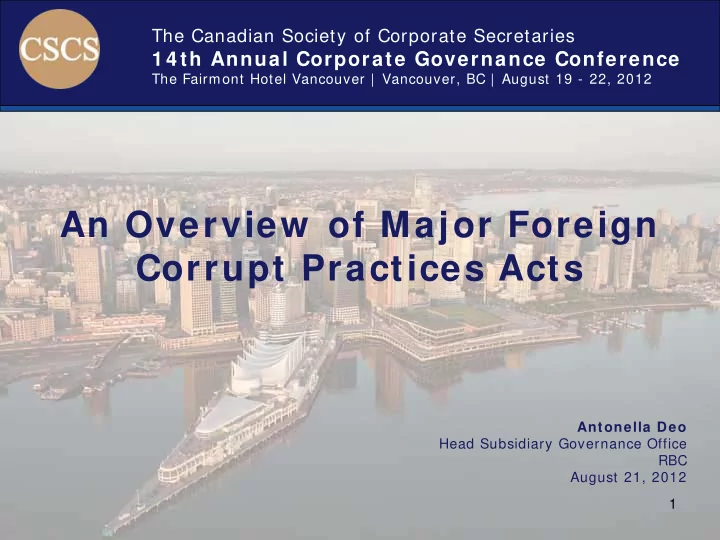

The Canadian Society of Corporate Secretaries 1 4 th Annual Corporate Governance Conference The Fairmont Hotel Vancouver | Vancouver, BC | August 19 - 22, 2012 An Overview of Major Foreign Corrupt Practices Acts Antonella Deo Head Subsidiary Governance Office RBC August 21, 2012 1
Agenda • International conventions • Overview of anti-bribery and anti- corruption legislation in Canada • Key differences in USA and UK legislation 2
International Conventions • Inter-American Convention Against Corruption (Organization of American States) - 1996 • Convention on Combating Bribery of Foreign Public Officials in International Business Transactions (OECD Convention) – 1997 • United Nations Convention Against Corruption (UN Convention) – 2005 3
Legislative Frameworks • Canada: Corruption of Foreign Public Officials Act (CFPOA) – in force 1999 – recent increase in enforcement activity • USA: Foreign Corrupt Practices Act (FCPA) – in force 1977 – significant enforcement activity • UK: Bribery Act 2010 (Bribery Act) – in force 2011 – increasing enforcement activity – the most stringent anti-corruption legislation 4
CFPOA Offences • W hat: any loan, reward, advantage or benefit of any kind given or offered, directly or indirectly • W ho: by any person to a foreign public official • W hy: as consideration for or to influence acts or decisions in order to obtain or retain an advantage in the course of business for profit • W here: “real and substantial” link to Canada 5
CFPOA Defences • Lawful in foreign state • Reasonable expenses • Facilitation payments • Mens rea – intention and knowledge 6
CFPOA Penalties • Indictable offence – no limitation period – maximum 5 year imprisonment – fines within judicial discretion, with no legislated maximum – extraditable – confiscation of proceeds of crime • Increasing enforcement activity – dedicated RCMP anti-corruption team – Public Prosecution Service Canada (PPSC) 7
OECD Criticisms of CFPOA • Restricted to business “for profit” • Ineffective sanctions • Limited jurisdiction • Prosecutorial discretion 8
FCPA: Key Differences • Broader range of offences: – Use of mails or interstate commerce in furtherance of an offence – Obligation for issuers to maintain accurate books and records and a system of internal controls – Senior officer of a company liable if (i) fails to create and implement anti- corruption controls, or (ii) consents or connives in an offence • Civil enforcement actions of issuers by SEC 9
FCPA: Key Differences • Broad extraterritorial application: – Territorial jurisdiction principle – any person or entity undertaking activities in the US (including use of mails or interstate commerce) in furtherance of an offence – Nationality jurisdiction principle – issuers and domestic concerns undertaking activities anywhere in furtherance of an offence • Includes foreign issuers with securities listed on a US exchange or registered with SEC • Includes organizations having a principal place of business in the US • Includes acts of foreign subsidiaries where authorized, directed or controlled the activity 10
Bribery Act: Key Differences • Broader range of offences – Private sector bribery (domestic and foreign) – Acceptance of bribes – Failure of commercial organization to prevent bribery - defence available if adequate procedures to prevent bribery – Senior officers of a company liable if “consent or connive” in the commission of an offence by the company • Facilitation payments not permitted 11
Bribery Act: Key Differences • Higher penalties: – Maximum of 10 years imprisonment • Broad extraterritorial application: – Nationality jurisdiction principle – connection to UK established based on nationality of offender, wherever the offence may occur – Extends to any entity formed in the UK or carrying on business, or part of a business, in the UK 12
Recommend
More recommend